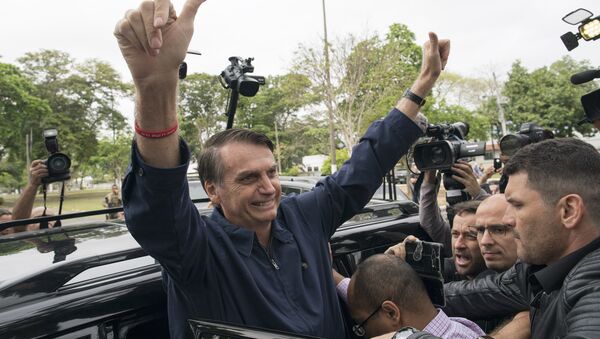Sputnik discussed the potential outcome of the vote in Brazil with Dr. Kai Michael Kenkel, a Professor at the Institute of International Relations at the Pontifical Catholic University of Rio de Janeiro.
Sputnik: What is it about him (Bolsonaro) that made him a front-runner, I mean how can his popularity be accounted for?
Dr. Kai Michael Kenkel: I think in Brazil we have two important phenomena going on right now, one is that we are in a very deep economic crisis that's created a level of desperation where people are looking for a strong leader or some sort of change, we're in an institutional crisis based on this impeachment that we had in 2016, it was sort a bit of evidence that the institutions really are not capable of defending themselves against polarization and politicization, and the second fact is that there is in this country a kind of an element of strong social change going on at the moment.
READ MORE: Brazil Ex-President Rousseff Fails to Win Senate Seat — Electoral Court
He has no commitment to dealing within the existing institutions and he has made very strong statements against minorities, against those who don't agree with him, he has announced repeatedly that he is willing to go outside of democratic ways and means and, nevertheless, people in Brazil seem to be showing a strong degree of support for him, or at least parts of the population.
Sputnik: Some analysts have been comparing Bolsonaro to President Trump, would you agree with this?
Dr. Kai Michael Kenkel: There are many differences between Bolsonaro and Trump, for me the comparison is much more with the Philippines' President Duterte than with Trump. The major difference for me being that in the United States you have not only democratic institutions that are in and of themselves strong and consolidated, but also a predominantly democratic mentality in the population, in those who are voting. You have this idea that people understand that democracy is something that actively needs to be protected. I don't think in Brazil that democracy has been able to make the same inroads in peoples minds, in general, in the big part of the population. I don't believe that the institutions are able to defend themselves in the same way that they are in the United States.
READ MORE: Brazilian Presidential Front-Runner to Gain 35% of Votes — Poll
Sputnik: In your opinion, how much is Brazil's pivot towards an anti-establishment leader, and we've seen this in many parts of the world, part of a general trend? Would you agree that the popularity of right-wing movements will continue to grow in the future on a worldwide scale?
Dr. Kai Michael Kenkel: It seems likely, I think, as I said, economic crisis tends to increase the fertile soil for populism and at the moment you see it in the United States with what some people have termed a culture war.
I think we're in a time when traditional views of who's been in charge and for the social hierarchy, the position of minorities, the position of women, the position of LGBT, the position of physical minorities, this hierarchy, this sorting of minorities to the bottom is being questioned, and I think we're in an epic backlash against this, sort of one last push perhaps, from those who are in control and want to stay there. So yes, I think it's a worldwide phenomenon, I think it has to do with the increasing integration of access to information and other progressive forces that've come to the fore that we now see a backlash against.
The views and opinions expressed by the contributors do not necessarily reflect those of Sputnik.


